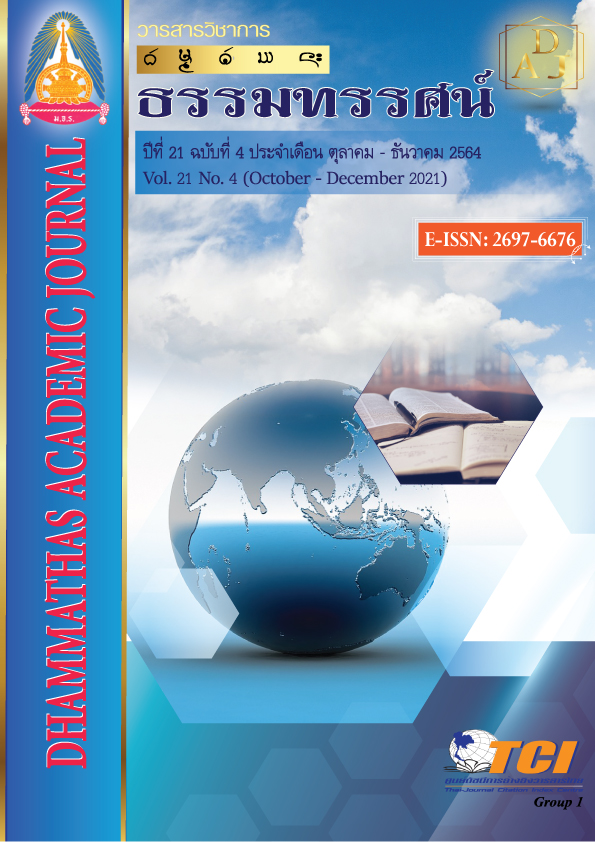The Effects of Positive Psychology Capital Enhancment Program of Students, Faculty of Education, Buriram Rajabhat University
Main Article Content
Abstract
This research of objective to: 1) there was a significant interaction between the techniques and the durations of the experiment at the .05 level, 2) Comparison of the post period positive psychology capital score of the experimental group and the control group, 3) Comparing the follow-up positive psychology capital period of the experimental group and the control group, 4) Comparing the pre period and post-experimental positive psychology capital score of the experimental group and 5) compared the positive psychology capital scores in the pretest and follow-up phases of the experimental group. Quasi-experimental research. The 24 samples were purposive sampling from 3rd year students of the Faculty of Education, Buriram Rajabhat University. The research instruments were 1) positive psychological capital assessment form with a reliability of .89 and 2) a positive psychological capital enhancement program. Data were analyzed with mean, standard deviation and two way repeated measures ANOVA.
The research found that:
1. There was Interaction between experimental methods and experimental periods at the significance statistical level of .05
2. The experimental group that participated in the positive psychological capital enhancement program had a higher psychological capital scores of post-experiment than the control group at significance statistical the .05 level.
3. The experimental group that participated in the positive psychology capital enhancement program had a psychological capital scores in the follow-up period higher the control group at significance statistical the .05 level.
4. The experimental group that participated in the positive psychology capital enhancement program had a higher psychological capital scores in the post-experiment period than in the pre-experiment period at significance statistical the .05 level.
5. The experimental group that participated in the positive psychology capital enhancement program had a psychological capital scores the follow-up period a higher than in the pre-experiment period with at significance statistical the .05 level.
Article Details
References
กาญจนา สุทธิเนียม. (2560). การพัฒนาทุนทางจิตวิทยาเชิงบวกของนิสิตครูโดยการให้การปรึกษากลุ่ม. วารสารการพยาบาลจิตเวชและสุขภาพจิต, 32(1), 17-32.
เกสร มุ้ยจีน. (2559). การสร้างความสุขด้วยจิตวิทยาเชิงบวก. วารสารวิทยาศาสตร์และเทคโนโลยี, 24(4), 673-681.
จริยา อัศวเพชรกูล. (2558). การเสริมสร้างพลังทางบวกของนักเรียนวัยรุ่นโดยการให้การปรึกษากลุ่มแบบบูรณาการ. วารสารพยาบาลทหารบก, 16(3), 79-86.
ดวงกมล เวชบรรยงรัตน์ และคณะ. (2556). พัฒนาการวัยรุ่นและการอบรม. นนทบุรี: มหาวิทยาลัยสุโขทัยธรรมาธิราช.
ธัญญภัสร์ ศิรธัชนราโรจน์. (2560). ความภาคภูมิใจในตนเองและความหยุ่นตัวของนักศึกษาระดับปริญญาตรี. Veridian E-Journal, Silpakorn University, 10(3), 512-529.
วิธัญญา วัณโณ. (2561). การประเมินความต้องการจำเป็นเกี่ยวกับทุนจิตวิทยาเชิงบวกทางวิชาการของนิสิตนักศึกษาไทย. วารสารมนุษยศาสตร์ปริทรรศน์, 40(2), 74-83.
ศรีเรือน แก้วกังวาล. (2553). จิตวิทยาพัฒนาการชีวิตทุกช่วงวัย เล่ม 1. (พิมพ์ครั้งที่ 9). กรุงเทพฯ: มหาวิทยาลัยธรรมศาสตร์.
สุณิสา คินทรักษ์. (2558). ผลของโปรแกรมฝึกอบรมต้นทุนทางจิตวิทยาที่มีต่อการเห็นคุณค่าในตนเอง. วารสารสมาคมจิตแพทย์แห่งประเทศไทย, 60(1), 49-57.
สุดารัตน์ ตันติวิวัทน์. (2560). จิตวิทยาเชิงบวก: แนวคิด การพัฒนา และความท้าทายในอนาคต. วารสารพฤติกรรมศาสตร์เพื่อการพัฒนา, 9(1), 1-12.
อังศินันท์ อินทรกำแหง และฉัตรชัย เอกปัญญาสกุล. (2561). อิทธิพลของจิตวิทยาเชิงบวก และบรรทัดฐานทางสังคมวัฒนธรรมที่มีต่อพฤติกรรมสุขภาพที่ดีและสุขภาวะครอบครัว โดยส่งผ่านความรอบรู้ด้านสุขภาพของครอบครัวในชุมชนกึ่งเมือง: การวิจัยผสานวิธี. วารสารพฤติกรรมศาสตร์, 24(1), 1-22.
Avey, J. B., Luthans, F. & Youssef, C. M. (2010). The additive value of Psychological capital in predicting workplace attitude and behaviors. Journal of Management, 36(2), 430-452.
Luthans, F., Youssef, C. M., & Avolio, B. J. (2007). Psychological capital: Developing the human competitive edge. UK: Oxford University Press.
Macey, W. H. and Schneider, B. (2008). The meaning of employee engagement. Industrial and Organizational Psychology, 1(1), 3-30.
Nelson, D. L. & Cooper, C. L. (2007). Positive organizational behavior. London: Sage Publications.
Schaufeli, W. B., et al. (2002). The measurement of engagement and burnout: A two sample confirmatory factor analytic approach. Journal of Happiness Studies: An Interdisciplinary Forum on Subjective Well-Being, 3(1), 71-92.
Seligman, M. E. (2007). The optimistic child: A proven program to safeguard children against depression and build lifelong resilience. Florida: Houghton Mifflin Harcourt.
Seligman, M. E., et al. (2009). Positive education: Positive psychology and classroom interventions. Oxford Review Education, 35, 293-311.
Snyder, C. R. & Lopez, S. (2002). Handbook to Positive Psychology. Oxford, UK: Oxford University Press.
Vaez, M. & Laflamme, L. (2008). Experienced stress, psychological symptoms, self-rated health and academic achievement: A longitudinal study of Swedish University students. Socıal Behavıor and Personalıty, 36, 183-196.

